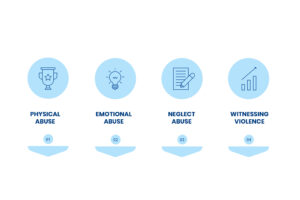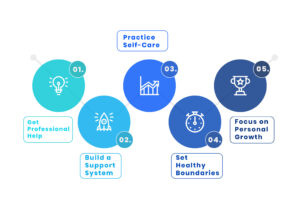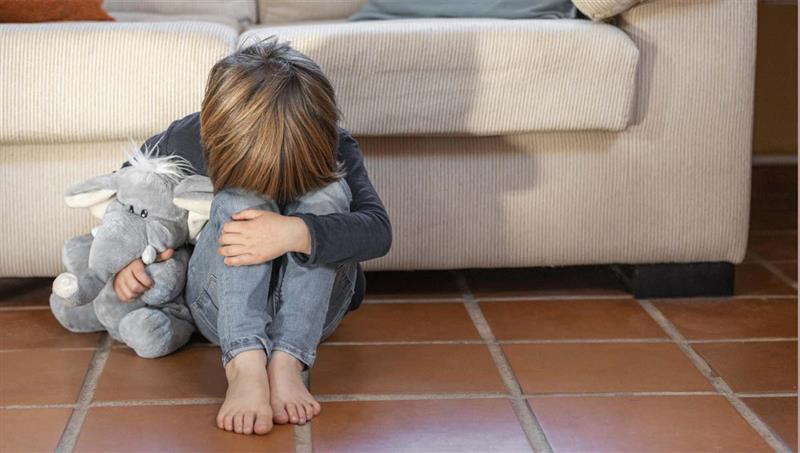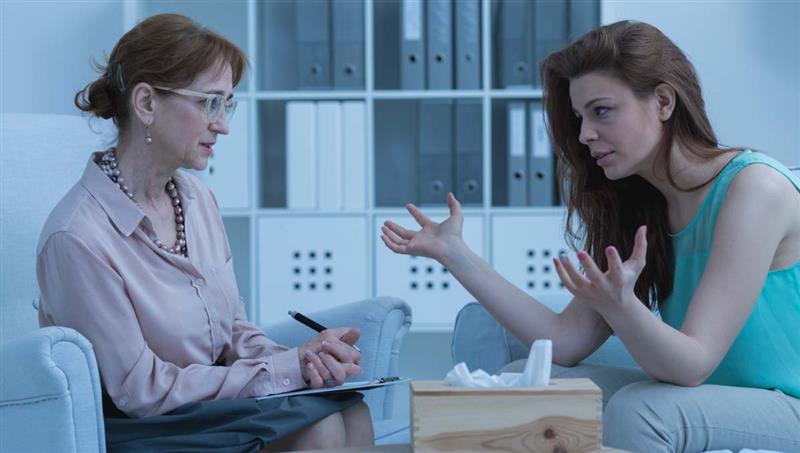Have you ever asked yourself how your childhood experiences make you what you are as an adult? Being exposed to childhood trauma may cause emotional wounds that can endure long-term consequences in terms of relationships, self-esteem, and mental state, even years after such events. Neither due to neglect, abuse, or excessive pressure, such early experiences may bring in the sensation of fear, anxiety, or sadness that are seemingly impossible to overcome.
At MAVA Behavioral Health, we focus on hearing your personal history and offering you caring service based on medication management. We want to see you back on balance, develop strength, and take advantage to move on in life, so we can create a future that is not determined by your past.
What Is Childhood Trauma?
Childhood trauma is a very disturbing or even frightening experience that happens when a child is still in their early years. In an example, it can include such events as abuse, neglect, severe accidents, or becoming victims of violence.
However, childhood trauma in adults leaves an imprint on the emotions, minds, and growth of a child and will largely lead to emotional suffering and disciplinary problems. Lastly, the trauma experienced as a child can be overcome with the help of the right person, and the children will be capable of living a normal and happier life ahead.
Signs Of Childhood Trauma
The following are the typical childhood trauma symptoms:
- Constant nightmares, difficulty sleeping.
- Sweaty outbursts of mood, irritability, or anger bursts.
- Cessation of association with friends and family or hobbies.
- Recurrent fears, anxiety, or depression.
- Poor self-esteem or feelings of guilt are continually present.
- Bravery or self-destructiveness.
Types Of Childhood Trauma

Physical Abuse
Physical abuse is a situation where the child is made the victim, either through premeditated violence, i.e., hitting, kicking, or other forms of violence. Injuries can be incurred, and fear and anxiety in the long term can be experienced as a result of such an experience. Children startle easily or become violent as a defense mechanism. Restore trust and emotional security quickly.
Emotional Abuse
Emotional abuse involves continuous criticism, rejection, or humiliation, and this kills the self-worth of a child. It may be screaming, embarrassing, or ignoring the feelings of the child. The result of this trauma is low self-esteem, depression, and failure to build healthy relationships.
Neglect
Neglect is observed to occur at a level whereby the basic needs of a child, like food, shelter, medical care, and emotional comfort, are not met. Children may experience difficulties with learning, socialization, and self-care. Regular care and foster conditions restore a stable life.
Witnessing Violence
The violence, such as domestic violence or crime in the neighborhood, is also devastating as real violence. Children who observe violence are also likely to become anxious, develop nightmares, and be alert. They are also able to imitate violent behaviors or intimidation in real-life situations. Early therapy and a safe atmosphere within the house minimize such long-term effects.
Childhood Trauma Examples
Here are some examples of childhood trauma:
- Verbal abuse is characterized by continually criticizing, rejecting, and humiliating.
- Lack of fundamental necessities such as food, shelter, medical care, or love.
- Experience of domestic violence or regular quarrels within the family.
- Severe sickness, accident, or lengthy hospitalization.
- Living through the natural disasters such as floods, earthquakes, or fires.
- Residing in a situation of parental drug abuse or extreme mental illness.
How To Heal from Childhood Trauma?

Get Professional Help
In collaborating with a therapist, you are able to make sense of painful memories and come up with healthy methods of coping. A professional will help you feel free and not afraid of expressing feelings after making the environment conducive. Workshops are good because they give you strength and enable you to go with your head up.
Build a Support System
Feeling safe and a part of a support group, friends, or family members form a sense of belonging. You can feel less isolated and afraid by telling your story to caring people. A good support system promotes positive transformation and emotional development.
Practice Self-Care
Exercise, meditation, journaling, and healthy eating are self-care practices that are performed on a daily basis and promote mental and physical well-being. The practices reduce stress levels, mood, and energy. A time plan reduces stress and increases control. Self-care will be the solution that will enable you to regain the trust that you had in yourself and be stable emotionally.
Set Healthy Boundaries
One of the benefits of having boundaries is that it allows you to prevent destructive relationships and situations through learning to establish boundaries. Self-respect is brought about by negativity denial and appreciation of your personal boundaries. It gives you a sense of security and gives you space to rest without being disturbed.
Focus on Personal Growth
Discover new activities, capabilities, or ambitions to take the mind off previous pain and think about future opportunities. When one develops at a personal level, a positive attitude is promoted, and self-esteem is boosted. It makes you invent a purposeful and meaningful life. When you are growth-oriented, you are subduing thoughts of pain with the thoughts of hope and accomplishment.
Effects Of Childhood Trauma on Mental Health
Childhood trauma has the most significant impacts on mental health, including:
- Vulnerability to developing mood disorders or depression increases.
- Problems with establishing healthy relations and trusting others.
- Fewer self-esteem, guilt, or shame.
- The risk of PTSD and flashback intrusion increases.
- Problems of anger control and emotional tantrums.
- Nightmares, sleep disorders, or insomnia.
Tips For Overcoming Childhood Trauma
Practice Mindfulness
Exercises like meditation and breathing into your deep lungs can cool your mind and leave you less stressed. Living in the now is one of the coping mechanisms to overcome the triggers and obsessive thoughts. Through practice, emotional equilibrium and self-awareness are increased.
Develop Healthy Habits
Healthy dieting, exercise, and enough sleep will make an individual stronger. Such practices improve the mood and boost energy, thus making the healing process easier. Stability makes one feel that life is stable and in control.
Create Healthy Relationships
Having good friends is important to help you with it, family members, or organizations. The exchange of experiences reduces feelings of loneliness and fear. Good relationships promote development and recovery.
Set Realistic Goals
Prefer to do a few but achievable activities that will lead to personal development. The promotion of progress instills confidence and motivation. These goals can help you become confident in yourself and your future in the long run.
Childhood Trauma Test and Diagnosis
One is an easy way of learning how your past experiences can still influence your thoughts and actions today, through a childhood trauma test. It typically entails inquiries about your childhood life. The test does not represent a conclusive diagnosis but provides hints on any emotional trauma that could require some focus.
Furthermore, they also scrutinize your test results, medical history, and present symptoms such as anxiety, depression, or trust problems. This step-by-step operation will make sure that you get the proper treatment plan of therapy, drug, or a combination of the two to help you heal in the long run.
Childhood Trauma Treatment Options
Medication Management
Anxiety, depression, or sleeping problems that might result from childhood trauma may be treated with drugs. To improve emotional balance, psychiatrists can prescribe antidepressants, mood stabilizers, and anti-anxiety drugs. Although the drug fails to bring back the traumatic memories, it will relieve distress, hence therapy and healing are successfully performed.
Initial Evaluation
The initial diagnosis is the beginning of the elaboration of a personal approach to treatment. The mental health practitioners determine how the past has been experienced, the medical history, or the existing symptoms to determine the effects of the trauma. This test can assist in determining the triggers and the relevant therapies to be taken in order to have a safe and enabling road to recovery.
Closing Note
Experiences of childhood trauma may have long-term emotional effects, but there is a way to treat them at MAVA Behavioral Health. With the assistance of individualized medication management, our mental health professionals provide compassionate care to reduce symptoms such as anxiety, depression, and emotional suffering.
We will begin by critically evaluating your personal needs to create a particular treatment plan that will enable the healing process and mental health in the future. To help you keep up with telehealth, we provide both types, and you decide which setting is comfortable to you. At MAVA Behavioral Health, you are able to take constructive steps towards recovery and a healthy future.
FAQs
How does childhood trauma show up in adults?
It may manifest itself in anxiety, depression, trust problems, relationship problems, or sudden anger. Low self-esteem or stress management in day-to-day life might be a problem with some adults.
Is it possible to heal childhood trauma?
Yes, it can be cured through regular therapy sessions, the use of medication when necessary, and when there is a good support system. With time, coping abilities and good habits diminish their effect.
Is childhood trauma equivalent to PTSD?
Not always. Trauma may cause PTSD, though not all individuals who meet the full criteria of PTSD may develop anxiety, depression, or emotional distress.
What is considered a childhood trauma?
Childhood trauma encompasses physical, emotional, or sexual assault, neglect, violence, or the death of a parent. Any incident that sends one into a state of great fear or helplessness can be traumatic.
How to deal with childhood trauma?
You can get professional assistance, e.g., CBT or EMDR. Engage in self-care through exercise, mindfulness, and establish positive relationships as support.









